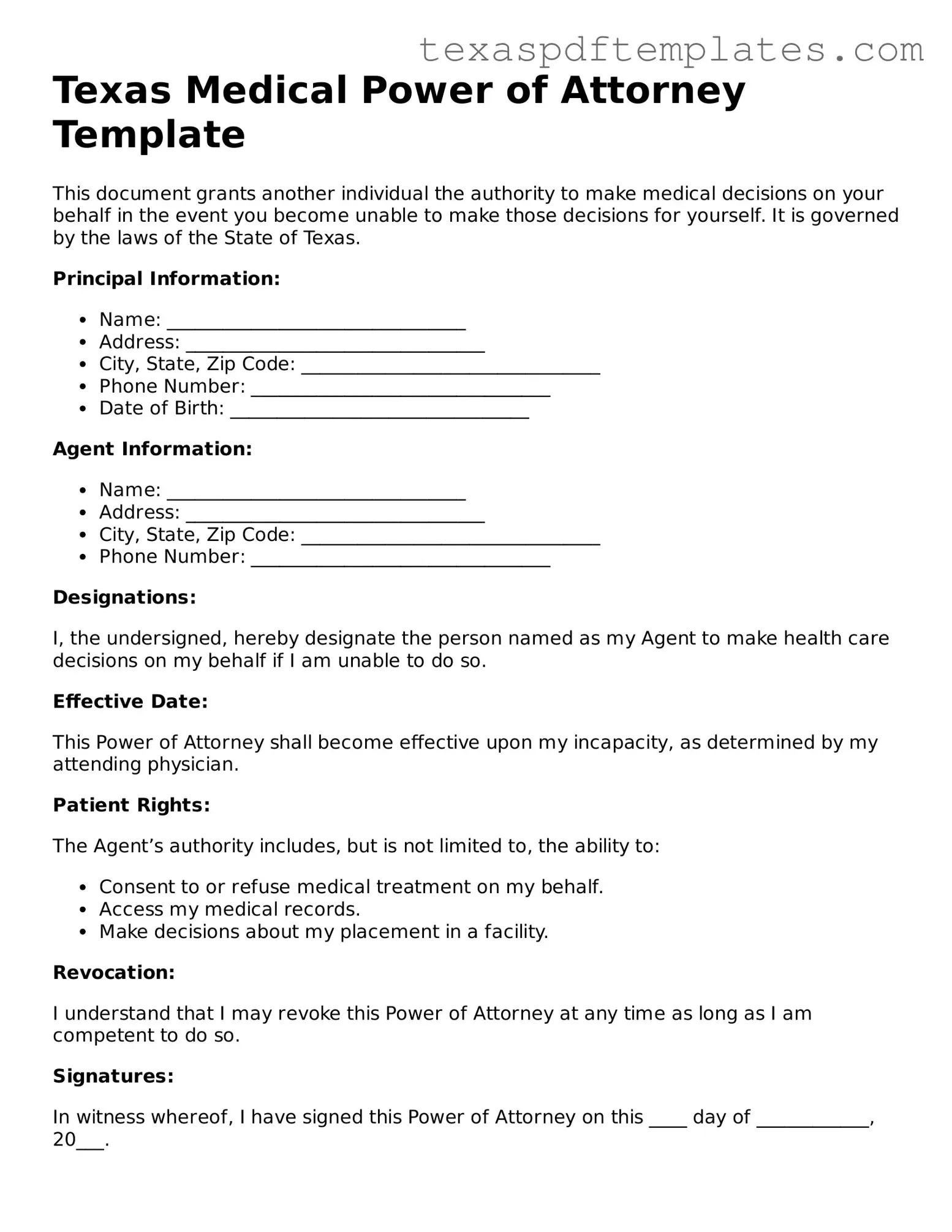Attorney-Approved Texas Medical Power of Attorney Template
Form Example
Texas Medical Power of Attorney Template
This document grants another individual the authority to make medical decisions on your behalf in the event you become unable to make those decisions for yourself. It is governed by the laws of the State of Texas.
Principal Information:
- Name: ________________________________
- Address: ________________________________
- City, State, Zip Code: ________________________________
- Phone Number: ________________________________
- Date of Birth: ________________________________
Agent Information:
- Name: ________________________________
- Address: ________________________________
- City, State, Zip Code: ________________________________
- Phone Number: ________________________________
Designations:
I, the undersigned, hereby designate the person named as my Agent to make health care decisions on my behalf if I am unable to do so.
Effective Date:
This Power of Attorney shall become effective upon my incapacity, as determined by my attending physician.
Patient Rights:
The Agent’s authority includes, but is not limited to, the ability to:
- Consent to or refuse medical treatment on my behalf.
- Access my medical records.
- Make decisions about my placement in a facility.
Revocation:
I understand that I may revoke this Power of Attorney at any time as long as I am competent to do so.
Signatures:
In witness whereof, I have signed this Power of Attorney on this ____ day of ____________, 20___.
- Principal Signature: ________________________________
- Printed Name: ________________________________
Witnesses:
- Witness Signature: ________________________________
- Printed Name: ________________________________
- Date: ________________________________
- Witness Signature: ________________________________
- Printed Name: ________________________________
- Date: ________________________________
The above signatures should be placed in the presence of at least two witnesses, as required by Texas law. The witnesses cannot be related to the principal by blood or marriage and cannot be the designated agent.
Other Popular Texas Templates
Marital Settlement Agreement Texas - Time frames for obligations must be clearly outlined in the document.
Texas Department of Motor Vehicle - Designate someone to handle your vehicle’s title and registration process.
Common mistakes
-
Not understanding the purpose: Many individuals fill out the Texas Medical Power of Attorney form without fully grasping its significance. This document allows someone to make medical decisions on your behalf if you become unable to do so.
-
Choosing the wrong agent: Selecting an agent who may not act in your best interests is a common mistake. It’s essential to choose someone you trust completely and who understands your medical preferences.
-
Failing to discuss wishes: Some people neglect to have conversations with their chosen agent about their medical wishes. Open dialogue ensures that your agent knows your preferences and can make informed decisions.
-
Not signing the document: A significant error is submitting the form without a signature. The Texas Medical Power of Attorney is not valid unless it is signed by you, the principal.
-
Ignoring witness requirements: In Texas, the form must be signed in the presence of two witnesses or a notary. Failing to meet this requirement can invalidate the document.
-
Leaving sections blank: Some individuals mistakenly leave parts of the form incomplete. Every section should be filled out to avoid ambiguity regarding your wishes.
-
Not updating the document: Life circumstances change. Failing to update the Medical Power of Attorney when your situation changes can lead to complications later.
-
Overlooking alternate agents: Designating an alternate agent is often overlooked. If your primary agent is unavailable, an alternate can step in to ensure your wishes are honored.
-
Assuming the form is permanent: Some individuals believe that once the form is completed, it cannot be changed. In reality, you can revoke or amend the document at any time as long as you are competent.
Key takeaways
Filling out a Texas Medical Power of Attorney form is an important step in ensuring that your healthcare preferences are honored. Here are some key takeaways to consider:
- Choose a trusted agent: Select someone who understands your values and wishes regarding medical care. This person will make decisions on your behalf if you are unable to do so.
- Be clear and specific: Clearly outline your preferences regarding medical treatments and procedures. The more detailed you are, the easier it will be for your agent to make informed decisions.
- Sign and date the document: Ensure that you sign and date the form in the presence of a notary public or two witnesses, as required by Texas law. This step is crucial for the document's validity.
- Distribute copies: After completing the form, provide copies to your chosen agent, healthcare providers, and family members. This ensures that everyone is aware of your wishes.
- Review regularly: Your medical preferences may change over time. Regularly review and update your Medical Power of Attorney to reflect your current wishes.
Steps to Using Texas Medical Power of Attorney
Filling out the Texas Medical Power of Attorney form is an important step in ensuring that your healthcare decisions are made according to your wishes. After completing the form, it should be signed and dated, then shared with your designated agent and healthcare providers.
- Obtain a copy of the Texas Medical Power of Attorney form. This can be found online or through legal offices.
- Begin by filling in your full name and address at the top of the form.
- Next, designate your agent. Provide their full name, address, and phone number in the appropriate section.
- Specify any limitations or specific instructions regarding your agent's authority, if desired.
- Fill out the section that indicates your preferences for medical treatment. Be clear and concise.
- Sign and date the form in the designated area. Make sure to do this in the presence of a notary public or two witnesses, as required.
- Provide copies of the completed form to your agent and any healthcare providers involved in your care.
